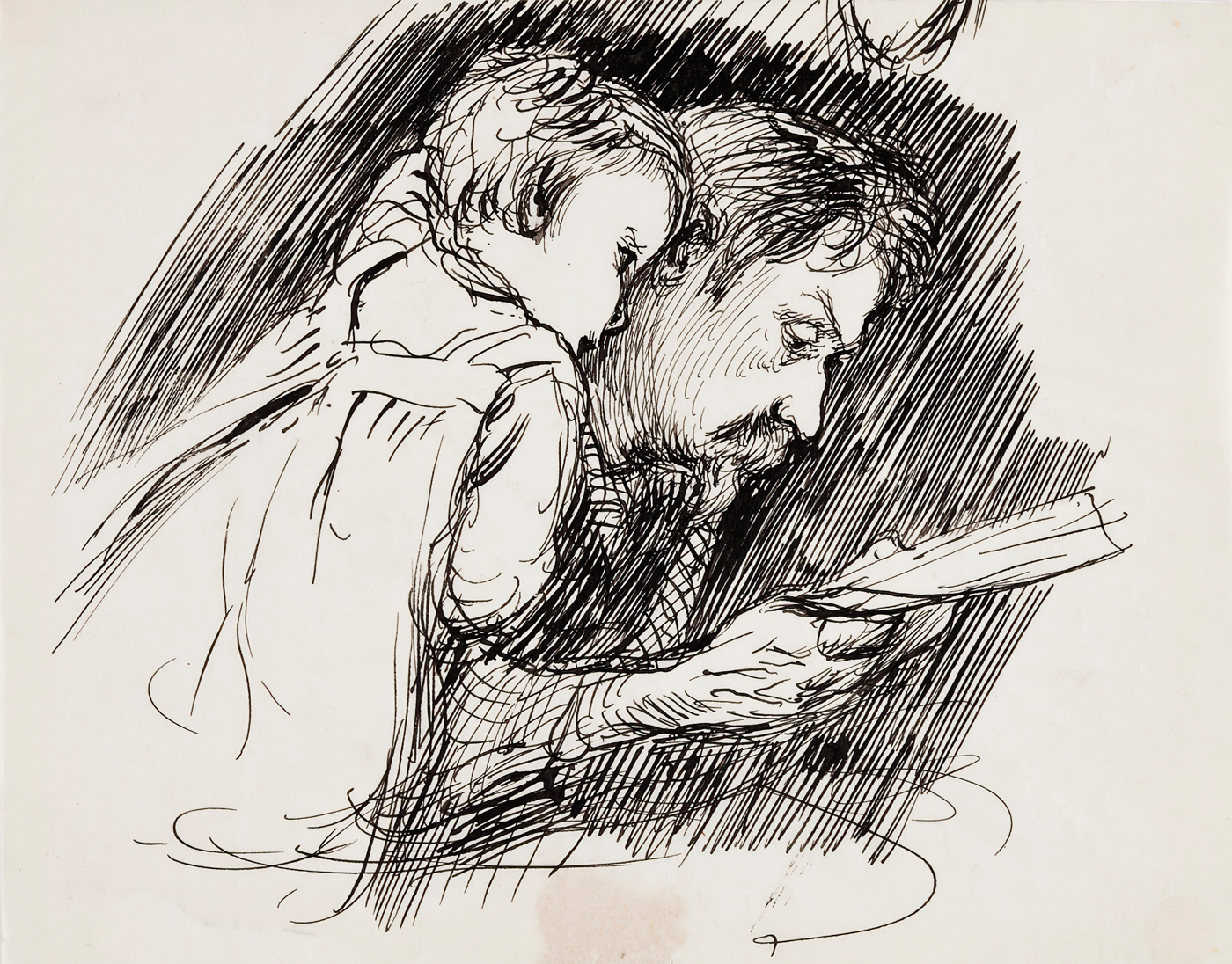What Will Tech Mean
to Gen Z Families?
A Conversation with Ben Christenson

Mr. Ben Christenson is a father and writer in Northern Virginia. He writes about technology, socializing, and young adulthood. Hearth & Field recently spoke with Mr. Christenson about the challenges that face his generation due to having grown up heavily immersed in digital technology and the internet.
Hearth & Field: You are a member of the first generation to grow up immersed in smartphone and internet technology, and you also married and became a father relatively early in life. How have these two things together influenced your family life?
Mr. Ben Christenson: When you get married and then have kids, you begin to see your family of origin through different eyes. First, you see through the eyes of your spouse and realize that your family has all sorts of quirks that you always took for granted. When you have kids, you have to come to terms with your own childhood and decide what things you want to repeat and what things you want to change. With my parents, I had much I was grateful for and wanted to replicate, but nearly all of my desired changes concerned technology. And that makes sense.
After all, people of my generation (I was born in 1997) were guinea pigs in terms of portable digital technology. The previous generation grew up without very much digital technology and were adults when smartphones were created, and the generation that follows mine never knew life without smartphones and the apps that run on them. So we were in between. My parents had no childhood experience of having a smartphone, for example, so when they were trying to decide whether I should get Facebook or a phone, there was little research and few points of reference to help them make their decision.
We’re not in the same place today. Not only is there a mountain of data now on the risks of early adoption of smartphones and social media, but my wife and I ourselves lived through this experiment of moving our lives online. When I think about whether I would allow my daughter to get Instagram at thirteen, I have my own fresh memories of how simultaneously addictive and depressing these platforms can be for teens.
This perspective, along with the research, has convinced me that adopting today’s digital status quo in our family and for our own children would border on gross negligence.
H&F: Why would it be negligent?
BC: We know that social media’s design specifically exploits adolescent craving for peer validation. Snapstreaks, likes, retweets, intermittent notification schedules, and the inevitable, quantifiable comparisons these features invite — at a time when comparison is so essential to identity — can lead to depression, suicide, and anxiety, as Jean Twenge and Jonathan Haidt have convincingly argued. A study from the CDC released earlier this year found that fifty-seven percent of high-school females reported persistent feelings of sadness or hopelessness, and it seems likely that social media is in large part to blame.
Additionally, besides opening the door to mental illness and a vacuous interior life, the frenzy to document and display every slightly interesting thought and moment of our lives via social media and texting creates huge liabilities. All of my peers know that somewhere out there, there are photos, videos, texts, and tweets that could ruin our lives. My only saving grace is that I grew up when most of the memory was on physical SD cards and camcorders. I can’t imagine what it’s like growing up with cell phones always around and every video saved in the cloud.
H&F: Where did you grow up, and how did you interact with technology in your school years?
BC: I grew up outside of Washington, DC, in an area full of strivers. Hoping to enhance our “technological literacy” and to attract more students, my high school gave us all tablets to use in our schoolwork.
To us students, this was a stunning turn of events from the books and paper we had been using.
Within an hour, we had figured out how to bypass the firewalls, and suddenly we had school-sanctioned Netflix. Firewalls, software blockers, and the like—they’re all a joke. My parents and teachers had no idea how truly bizarre, grotesque, and accessible the dark corners of the internet could be and how weak the safeguards against these were. And the tablets didn’t make us more literate or intelligent. They just let us goof off, covering it all up by using Google at the last minute to do “research” for our papers and prepare for our exams.
Within an hour, we had figured out how to bypass the firewalls, and suddenly we had school-sanctioned Netflix. Firewalls, software blockers, and the like — they’re all a joke.
I should give credit where credit is due: I think I wouldn’t have passed my AP European history exam if I hadn’t played the computer game Age of Empires all growing up. The internet or video games can be helpful for acquiring knowledge, obviously. But it can be easy to conflate what you can look up with what you actually know, and emphasizing “technological literacy” and “critical thinking” can paper over vast gaps in knowledge. At the time, we students were happy to watch Netflix instead of paying attention in class.
H&F: So your parents’ generation was hoodwinked by the promise of tech for their children, in your opinion. But you yourself are aware of the negative effects tech in schools had on you and your peers growing up. So why does your generation still embrace tech so fully for yourselves, if you have experienced how it can keep you from better things?
BC: That’s something we’re all grappling with. Nicholas Carr has a famous article in which he admits that constant internet use made him jittery, constantly craving stimulation, and unable to focus on long passages of reading. I definitely see myself in that description, and I think most people would. Faced with a decision between something convenient and fun or something difficult but rewarding, we often choose the former.
Even many professors admit, according to a New Yorker article I read called “The End of the English Major,” that they hardly ever read books anymore. Instead, they watch TV series like Better Call Saul and read websites. If this is how professors behave, it’s hard to expect the average person to make time for Tolstoy. I recently read that seventy-six percent of eighteen to twenty-four-year-olds use TikTok — when you’re accustomed to that kind of stimulation, deep reading may be at best unattractive and at worst impossible.
I don’t want to sound naïve. It’s not as if before Facebook and Netflix all kids were champing at the bit to read The Iliad. But I think my generation had an unprecedented combination of low levels of responsibility and potent forms of entertainment. It’s almost banal at this point to observe that the internet provides free Yale courses online and Christian Classics Ethereal Library, but it is PornHub, TikTok, and YouTube that are the hugely popular websites, not the educational ones. We all struggle to put long-term goods over short-term pleasures, but developing brains, especially male brains, lack impulse control.
For most of my peers, school was a utilitarian exercise. Get an A, get into a good school, get a good job. So, if you can get an A and shop online or watch a movie at the same time, that’s just a win-win. What was weird to me at the time was how many adults went along with it.
H&F: So where do young parents like yourself go from here?
BC: In the movie Marriage Story, Ray Liotta’s character, a divorce lawyer, has a great line explaining his negotiating philosophy: “If we start from a place of reasonable, and they start from a place of crazy, when we settle, we’ll be somewhere between reasonable, and crazy, which is still crazy. Half of crazy is crazy.” If they start at crazy, you have to start at another kind of crazy to end up at reasonable.
Sometimes, I feel like that’s where we are as parents. If you look at mental health and educational outcomes, the only generation worse off than Gen Z might be the next generation after us. So it seems like considering something out-of-the-ordinary is warranted. Will that mean delaying phones for a long time for our children? Homeschooling? Homesteading? I’m not sure.
My children are both under two, so this decision is a few years off, but the possibility of homeschooling, in particular, intrigues me. In reading the novel The Every recently, my wife and I were struck by a description of a teenager, Delaney, who is distracted, overwhelmed, and sleepless because of her phone’s constant intrusions. Her parents, seeing her misery, organize an emergency digital detox and begin homeschooling her. She gradually retrains her mind, until — after a few weeks — she can think for an hour straight, and after a month she can read books and form original thoughts again. She eventually returns to spending time at her childhood reading nook by the river.
Now, that may be a bit romantic, but it resonated with us. Helping your child to claim his mind, to pay attention, to make connections . . . these strike me as worthy, if not easy, aspirations. Homeschooling isn’t the only way to do that, but it does seem to be one obvious way to strive for that.
My father-in-law likes to say he can tell a homeschooling child because the child will engage an adult in normal conversation, rather than awkwardly avoiding them. It seems worth considering homeschooling and other outside-the-box options to try to guard against the craziness that is now the norm.
H&F: What are your thoughts about Artificial Intelligence and the way that it is becoming pervasive in both children’s and adult’s culture?
BC: AI is such a huge topic, and I don’t want to paint with too broad a brush. I’m sure there are research and technical applications of AI that will be beneficial, as with any technology. My skepticism is around activists who talk as though AI will replace all human connection. They seem to see AI as an affordable, accessible, personally tailored therapist, educator, confidante, and nanny all in one piece of tech.
Besides the obvious ways this is already going awry, namely that AI doesn’t always give good advice, I think there is a hidden assumption here that more technology is always better. The thinking follows a pattern: Whenever a problem arises, we presume that the solution lies within more or newer technology. If we’re disconnected, we think that Facebook needs to find ways to use AI to better connect us (rather than that we need to make more in-real-life connections). If we can’t get kids to turn off their phones while doing their homework, we presume the solution is to use AI on children’s phones to offer personalized instruction (rather than to provide an in-person tutor, for example).
Some of the problems technology creates don’t require technological solutions. Unplugging for the weekend, reading physical books, deleting social media, joining a church that emphasizes in-person community and physical sacraments, or taking a long hike might be both the simplest and most effective solutions to something like phone addiction or social-media-induced anxiety.
I do fear that as AI becomes more integrated into our infrastructures, significant opting-out will become increasingly difficult. I got a taste of this when my electric company recently tried to install smart meters on my street. For privacy concerns, I declined. In response, I got a letter that restated how much more information a smart meter can collect and a not-too-subtle nudge: “Hopefully, you will agree upgrading to a smart meter offers many benefits and is the best option for you.” They warned that I may be charged extra for a meter reader to come out, and someday, I may not have a choice at all. For now, I’ll just pay extra. But not everyone can — and at some point, declining the invasive tech may not even be possible.
H&F: Okay, so what’s the point of resisting, then?
BC: Because the alternative — a “normal” life, devoid of religion, nature, and genuine friendship — is demonstrably miserable. Who knows what wacky views the internet will inculcate in the next generation, but it’s hard to imagine that the true, good, and beautiful will ever be trending. Outrage, ignorance, and docility are better for business.
Wendell Berry has a great line about this: “It is easy for me to imagine that the next great division of the world will be between people who wish to live as creatures and people who wish to live as machines.” I hope my children can grow up to be creatures, which may require they become “backward” in the world’s eyes. As I know from experience, there are worse fates.
I hope my children can grow up to be creatures, which may require they become “backward” in the world’s eyes. As I know from experience, there are worse fates.
H&F: What are some specific ways that you are succeeding with this in your family life, and what are the personal challenges you and your wife are facing in this area?
BC: My children are very young, so we do not yet have the problem of, say, arguing with a tween about getting a smartphone. The biggest problem now is my children’s parents behaving poorly! It’s so easy to get caught up in sending a quick email, reading a text, et cetera. My daughter doesn’t understand much about it except that Dad is not paying attention to her.
So while I generally try to avoid that when I’m with my wife or kids, I try to focus especially on achieving some regular small victories. A coffee date with my wife where we leave our phones at home is one such victory. An afternoon walk, wrestle on the rug, or breakfast with my older child without any digital intrusions or podcast playing is another.
I find it very difficult to do even these few things this way! I’m as guilty as anyone of always wanting entertainment. I think modeling good behavior will be harder in some ways than inculcating it. Adults have so many rationalizations!
H&F: How does your approach to tech mesh with your work in the home and your writing?
BC: The biggest surprise was how much of my tech use was habitual rather than genuinely necessary. When you worry your boss may have messaged you, checking your phone is easy to justify. Then suddenly I was my own boss, but I kept checking my email and texts out of habit. If I’m honest, checking for a new email, message, or article is just fun.
Most of us, myself included, aren’t in a position to unilaterally withdraw from the rapid pace of modern life. At the same time, I try not to be too fatalistic about it. I now know some of my problems are self-inflicted, and there’s a lot of room for improvement at the margins.
It’s helpful to have people such as Paul Kingsnorth, who show us the way: not because you can entirely mimic their life but because they can serve as inspirations. The challenge is to not beat yourself up but also not become complacent.
As for writing, I write by hand as much as I can. Computers can be helpful, but as a tool, they tend toward hyperstimulation and multitasking. A pen and paper make the writing process more focused and more fun. I’m hardly the first to observe or practice this, but I wholeheartedly endorse writing drafts longhand.
H&F: Any last thoughts?
BC: I think there can be a vicious cycle at play here wherein you crave constant stimulation and so use your phone or computer more and more, which in turn makes you crave stimulation even more. It’s basic addictive behavior.
Nevertheless, I’m always surprised by how restorative a brief dose of humane activity can be. Reading for just a half hour; having a one-hour conversation without phones; attending a weekday church service; mowing the lawn without the distraction of a podcast or music playing. You don’t have to go on a retreat or do something exotic to get a little perspective and sanity.
On the one hand, humanity has survived much worse than an environment that’s too abundant and stimulating. Of all the times to be born, this is a great time. On the other hand, these problems borne of progress are novel in many ways, and the rate of change is disorienting. Navigating them will require creativity and discernment.
I always come back to the Thomas Sowell line: “There are no solutions. There are only trade-offs.” The real question for each of us is where will you draw the line, and the real test is whether you can stick to it, if imperfectly. For me, that’s a daily challenge — but then again, most important things are.





















